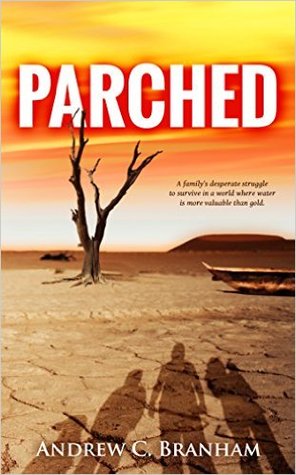
Parched by Andrew C. Branham is about one family’s desperate struggle for survival in a sun-blasted future.
The opening scene of Parched largely sets the tone for the remainder of the book – water is incredibly scarce, people are desperately afraid, and the basic foundations of humanity are disappearing. This post-apocalyptic novel by Andrew Branham is set in a future Earth where the sun has swollen to a red giant, wreaking havoc on the planet’s geography, drying up the water, and baking the human species to the edge of extinction.
As is the case in many apocalyptic novels, movies, or television shows, a single family’s struggle for survival lies at the center of the plot. This book contains all the classic developments seen in this genre: children having to grow up too soon, the boundaries blurring between parental responsibility and childish dependence, occasional plot-progressing tragedies that separate family members, and the need to “go out in the world” in search of a better future.
This is not to say that the novel is clichéd or overly predictable; in fact, aside from following a road novel format, the story itself was enjoyable and engaging. The family’s patriarch, James, fits the “devoted family man who’s good with a gun” persona to a tee, quite reminiscent of Rick, the main character from “The Walking Dead,” but there are also introspective, personal, and tender moments between James and his family. Unfortunately, at times, James’ wife and children seem like little more than liabilities, and their personalities don’t seem as thoroughly developed.
Additionally, the progression of the story is slow, and there were a few scenes of road life that felt repetitive or unnecessary to the larger story arc. In the context of these characters, the constant need to seek water, food, and shelter is obvious, but it’s important for a novel in this genre to show both the external and internal struggles.
Despite the slightly redundant road recollections and superficial narration, there is a constant urgency and energy in the writing that makes it difficult to put down. This resilient family always seems to be running away from something, narrowly escaping danger, and eking by to survive – it was exhausting just reading about their life on the run!
The most powerful parts of this story are when the lines of morality begin to blur in the family’s quest for survival. Branham does a particularly great job depicting James as an evolving character, showing how the pressure and responsibility of protecting his family pushes him to desperate measures and questionable actions. The tense scene where James holds a young girl hostage to ensure that the girl’s “people” won’t attack his family is a true turning point in the story for his development. After that, the story takes a decidedly dark turn, and readers are forced to ask themselves whether they would have done anything differently, had it been their family in danger. As Nietzsche says, “Whoever fights monsters should see to it that in the process he does not become a monster.”
At its core, Parched is about hope and survival against all odds, and the personal demons we must face when our bodies and minds are pushed to the limit. However, the underlying message is that the bonds of family, morality, and humanity can be bent, but never broken.
Links
Author Site
Facebook
Amazon
Goodreads
Review Overview
Design
Editing
Content
Get an Editorial Review | Get Amazon Sales & Reviews | Get Edited | Get Beta Readers | Enter the SPR Book Awards | Other Marketing Services























Leave A Comment